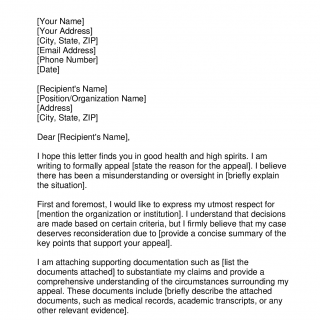Writing an Appeal Letter
Writing an Appeal Letter: A Step-by-Step Guide to Effective Communication
Learn how to write a persuasive appeal letter by following a specific format and guidelines. This comprehensive resource provides instructions, tips, and examples to help individuals structure their letters, choose the right tone, and present a compelling argument. Increase your chances of a favorable outcome by advocating for your cause using this valuable guide.
Overview and Purpose:
- Understand the main purpose and importance of writing an appeal letter effectively
- Learn how to effectively communicate your appeal by following specific guidelines and format
Structure and Components:
- Discover the essential parts that make up a well-structured appeal letter
- Highlight the importance of each component, including the heading, salutation, introduction, body, conclusion, and closing
Choosing the Appropriate Tone:
- Understand the significance of tone selection and how it can impact the overall effectiveness of your appeal
- Discover tips and strategies for choosing the right tone to convey your message persuasively
Presenting a Persuasive Argument:
- Learn techniques for presenting a strong and logical argument in your appeal letter
- Understand the importance of supporting evidence, relevant facts, and clear reasoning to strengthen your case
Supporting Examples and Templates:
- Find examples and templates that can assist you in crafting a personalized appeal letter
- Explore real-life scenarios and practices where appeal letters are commonly used (e.g., academic appeals, insurance claims)
Sample of Writing an Appeal Letter
[Your Name]
[Your Address]
[City, State, ZIP]
[Email Address]
[Phone Number]
[Date][Recipient's Name]
[Position/Organization Name]
[Address]
[City, State, ZIP]Dear [Recipient's Name],
I hope this letter finds you in good health and high spirits. I am writing to formally appeal [state the reason for the appeal]. I believe there has been a misunderstanding or oversight in [briefly explain the situation].
First and foremost, I would like to express my utmost respect for [mention the organization or institution]. I understand that decisions are made based on certain criteria, but I firmly believe that my case deserves reconsideration due to [provide a concise summary of the key points that support your appeal].
I am attaching supporting documentation such as [list the documents attached] to substantiate my claims and provide a comprehensive understanding of the circumstances surrounding my appeal. These documents include [briefly describe the attached documents, such as medical records, academic transcripts, or any other relevant evidence].
Moreover, I would like to draw your attention to [emphasize additional factors or arguments that reinforce your appeal]. It is essential to highlight [mention any critical aspects that could potentially sway the decision in your favor].
Throughout my experience with [mention the institution or organization], I have always been committed to [state your past achievements and contributions]. I firmly believe that this appeal presents an opportunity to rectify any misjudgment or oversight and restore my faith in the system.
I kindly request your careful consideration and review of my appeal. I genuinely believe that by reevaluating my case, you will see the validity and merit behind my plea. I am confident that, upon reviewing the attached documents and taking into account the circumstances, you will come to a fair and just decision.
Thank you for your time and attention to this matter. I highly appreciate your consideration, and I eagerly await your response. Should you require any further information or clarification, please do not hesitate to contact me at [provide your contact information].
Yours sincerely,
[Your Name]
Strengths, Weaknesses, Opportunities, Threats (SWOT):
- Strengths: Highlights the ability of an appeal letter to effectively advocate for your cause
- Weaknesses: Lack of guidance for complex or unique appeal situations may require additional research or support
- Opportunities: Provides individuals with the opportunity to improve their written communication and persuasion skills
- Threats: The choice of tone, arguments, or presentation may weaken the effectiveness of the appeal letter
Related and Alternative Forms:
- Explore related forms, such as formal letters or petitions, that can be used for similar purposes
- Understand the differences between these forms and appeal letters, and when each is most appropriate
Impact on Participants' Future:
- Understand how a well-crafted appeal letter can positively influence the outcome of the appeal
- Acknowledge that a poorly written letter may negatively affect the desired resolution
Submission and Storage:
- Learn where and how to submit your appeal letter (e.g., mail, email, online form)
- Highlight the importance of keeping a copy of the sent letter for personal records and future reference
By following this comprehensive guide, individuals can confidently write persuasive appeal letters that effectively advocate for their cause, increasing the chances of a favorable outcome.

